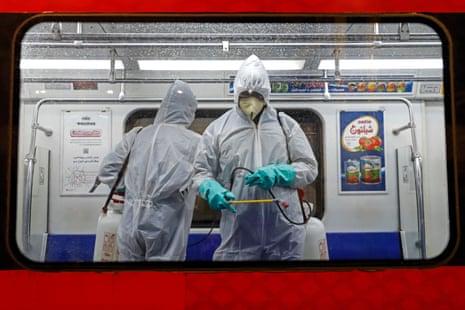Reuters is reporting that the French health minister has said the number of confirmed coronavirus-infected patients in the country has risen to 73.
Trump says US virus response 'most aggressive in modern history' – as it happened
US confirms first death in Washington state and strengthens travel advice, raising Iran and Italy to a level three. This blog is closed
Sat 29 Feb 2020 15.04 EST
First published on Fri 28 Feb 2020 21.21 EST-
US confirms first coronavirus death
-
Italy death toll jumps by eight to 29
-
Northern Ireland first coronavirus case confirmed by lab tests
-
Three more positive diagnoses in the UK, DHSC reports
-
France bans gatherings of more than 5,000
-
Global stock markets expected to fall further
-
Summary: Preventive measures spread as South Korea cases surge
-
South Korea reports another 219 new infections
-
Summary: travel bans and infections of 'unknown origin'
-
Australia implements travel ban to Iran
-
South Korea warns of 'critical moment' in battle against coronavirus, following biggest daily jump in infections
-
Elementary school closed in Oregon, US, due to coronavirus risk
-
Coronavirus risk to Gold Coast beauty salon patrons

Live feed
-
US confirms first coronavirus death
-
Italy death toll jumps by eight to 29
-
Northern Ireland first coronavirus case confirmed by lab tests
-
Three more positive diagnoses in the UK, DHSC reports
-
France bans gatherings of more than 5,000
-
Global stock markets expected to fall further
-
Summary: Preventive measures spread as South Korea cases surge
-
South Korea reports another 219 new infections
-
Summary: travel bans and infections of 'unknown origin'
-
Australia implements travel ban to Iran
-
South Korea warns of 'critical moment' in battle against coronavirus, following biggest daily jump in infections
-
Elementary school closed in Oregon, US, due to coronavirus risk
-
Coronavirus risk to Gold Coast beauty salon patrons
Chevron Corp said on Saturday that an employee in its Canary Wharf office in London who reported a flu-like illness, prompting the oil firm to send its staff home, has tested negative for the coronavirus, Reuters reports.
On Tuesday Chevron asked about 300 British employees to work temporarily from home after an employee in its Canary Wharf office in London developed flu symptoms after returning from Northern Italy.
It said it was proceeding with plans to have its staff return to the office.
Switzerland is up to 17 cases of coronavirus infection - 12 confirmed and five awaiting confirmation - according to local media.
Several areas, including the canton of Bern, have tightened preventive measures first announced on Friday, including a ban on public assemblies of more than 1,000 people, RTS reports.
Event cancellations include Moutier carnival, which had been expected to go ahead because less than a thousand visitors were expected.
A major real estate exhibition in Cannes has delayed for three months due to growing concern over the spread of the coronavirus.
MIPIM, which describes itself as the world’s leading property market, was expected to take place between March 10-13 dates, but it has been pushed back to early June in the hope the threat posed by the coronavirus will have reduced.
Paul Zilk, chief executive of Reed MIDEM which organises the event, said:
The well-being of our clients and staff is our priority. Given the evolving context, the best course of action is to postpone MIPIM to June.
This is not a decision we have taken lightly. We believe these new dates will provide the international MIPIM community with the opportunity to achieve their business objectives.
We are grateful to our clients for their support and constructive input during this challenging period, and we look forward to talking with them in the coming days about MIPIM in June.
Italy’s tourism industry has been dealt its final blow, the head of its hotel federation has lamented, after the US advised its citizens to reconsider travelling to the country.
Hotel reservation cancellations have already reached about 90% in Rome, while Venice has seen bookings plummet after regional officials cancelled the final two days of carnival celebrations this week in an unprecedented move in modern times.
On Friday, the US government issued a level three advisory, the second-highest level of warning for the whole of Italy, and announced that the Centers for Disease Control and Prevention had recommended avoiding non-essential travel to the Mediterranean country.

We had already registered a slowdown of Americans coming to Italy in recent days, Federalberghi president Bernabo Bocca said in a statement on Saturday, adding that the final blow had now arrived.
Bocca criticised measures to help the tourism industry, including delaying deadlines for tax payments and pausing mortgage repayments, as insufficient. He urged further help to guarantee cash flow to tourism operators to “avoid the collapse” of an industry which operates 300,000 businesses and employs 1.5m people.
More than 5.6 million Americans visit Italy every year, the second-largest national group behind Germans, representing 9% of foreign tourists in Italy.
Americans are among the biggest spenders at an average of €140 euros a day for a collective total of €5bn euros a year, the hotel federation Federalberghi said.
Other major countries have only issued warnings about defined areas of northern Italy where most cases of the coronavirus have been recorded. Italy has currently confirmed almost 900 cases, by far the highest figure outside Asia. There have been 21 deaths among people with the virus.

Global stock markets expected to fall further

World stock markets are expected to fall further next week after the first surveys of China’s economic health since the coronavirus outbreak showed factory output plunged and the country’s service sectors contracted.
Illustrating how the virus could wreck the economic forecasts of other affected countries, the world’s second largest economy reported that manufacturing production levels dropped to record lows this month.
Stock markets tumbled last week as the virus spread to four continents and UN health officials upgraded the level of threat from the virus to “very high”.
It is likely the fresh data, which measures the economic impact of Beijing’s efforts to clampdown on the virus, will further spook investors who sent global markets tumbling 11% last week in the worst seven-day period for stocks since the 2008 financial crash.
With factories forced to remain closed after the traditional lunar new year holiday shutdown, China’s official Purchasing Managers’ Index (PMI), a widely-watched measure of economic activity, fell further this month than at any time in the last 12 years, China’s National Bureau of Statistics said.
The bureau found a worrying collapse in domestic and export orders and a contraction of the country’s burgeoning service sector.
Similar surveys expected next month covering Japan and South Korea, both badly affected by the coronavirus outbreak, could prolong the rout on global stock markets, analysts said.
The outbreak has already disrupted supplies to factories in Europe, where companies have struggled to access vital components sourced from the far east.
Investors expect to find out in the next few days whether the outbreak is accelerating in the United States, the world’s biggest economy, and how far central banks and governments are prepared to go to deal with an epidemic.
“Right now the market is saying that this is unbounded. We don’t know what the limits are and we don’t know where it’s going to peak,” said Graham Tanaka, chief investment officer at New York-based Tanaka Capital.
Stock markets globally lost about $5tn of value last week, as measured by the MSCI all-country index.
Last weekend, president Xi Jinping told local officials that low-risk areas should “resume full production and normal life”.
The government reported that larger factories’ reached 85.6%of their capacity by the middle of last week.
Analysts at ING said: “This isn’t as positive as it sounds. Even if China‘s factory production can recover in March, it will still face the risk of a low level of export orders. This is because the supply chain will continue to be broken, this time in South Korea, Japan, Europe, and the US, where Covid-19 has begun to spread.”
Unofficial reports show that factories outside Hubei province, where the virus started, could be working at no more than 75% of their capacity and many nearer 25% to 50% while millions of workers remain trapped in their home province, unable to travel back to their place of work.
The Qatari national who is the first confirmed case of the coronavirus in the Gulf state is a 36 year-old who returned recently from Iran and is in a stable condition, the country’s health ministry has said.
The UAE education ministry also announced the suspension of nursery school classes, as the regional business hub and major transit point for air travellers stepped up its contingency plans. Saudi Arabia is now the only Gulf country not to have signalled any cases of the coronavirus.
Iran is preparing for the possibility of testing tens of thousands of people for the coronavirus as the number of confirmed cases in the country spiked once again, according to an official quoted by the Associated Press.
The virus and the COVID-19 illness it causes have killed 43 people out of 593 confirmed cases in Iran, health ministry spokesperson Kianoush Jahanpour said, disputing reports that four times as many people have died.
The death rate from the virus in Iran, about 7%, has caused global consternation and fuelled speculation that the country could be underreporting the number of cases affecting it.

However, Jahanpour attempted to put the public health crisis into perspective. He said that more than 480 people in Iran had been killed in traffic accidents, but no one noticed them.
Saturday’s new toll of 593 confirmed cases represents a jump of 205 cases, a 52% increase from the 388 reported the day before.
Jahanpour has warned that large increases in the number of confirmed cases would happen as Iran now has 15 laboratories testing for the virus, as spray trucks and fumigators into the streets are sent into streets.
He went on to suggest tens of thousands could seek testing for the coronavirus, while encouraging people to continue to avoid mass gatherings, even funerals for those who died of the virus. The safest place is our homes and our cities, he said.

Summary: Preventive measures spread as South Korea cases surge
- South Korea has reported a “critical moment” in its battle against coronavirus transmission after 813 new cases were detected in the country in a single day.
- The northern Japanese island of Hokkaidao has announced a three-week state of emergency, part of a number of measures implemented in Japan to slow the outbreak.
- The US has reported three new cases of the virus where the infection if of unknown origin. The patients in California, Washington state and Oregon had not travelled overseas or come into close contact with known carriers.
- The US Centers for Disease Control and Prevention has said it will have new coronavirus testing kits delivered to all states by the end of the week, after the first lot of tests were faulty.
- Mainland China reported the lowest number of new cases in a month, with 427 new cases reported, of which all but four were in Hubei province. There were 47 new deaths reported.
- Globally, there are an estimated 85,000 cases of Covid-19 and some 2,900 deaths. The virus has been detected in 58 countries.
Qatar’s health ministry reported on Saturday the first case of coronavirus infection in the country, Reuters reports the state-run Qatar News Agency as saying.